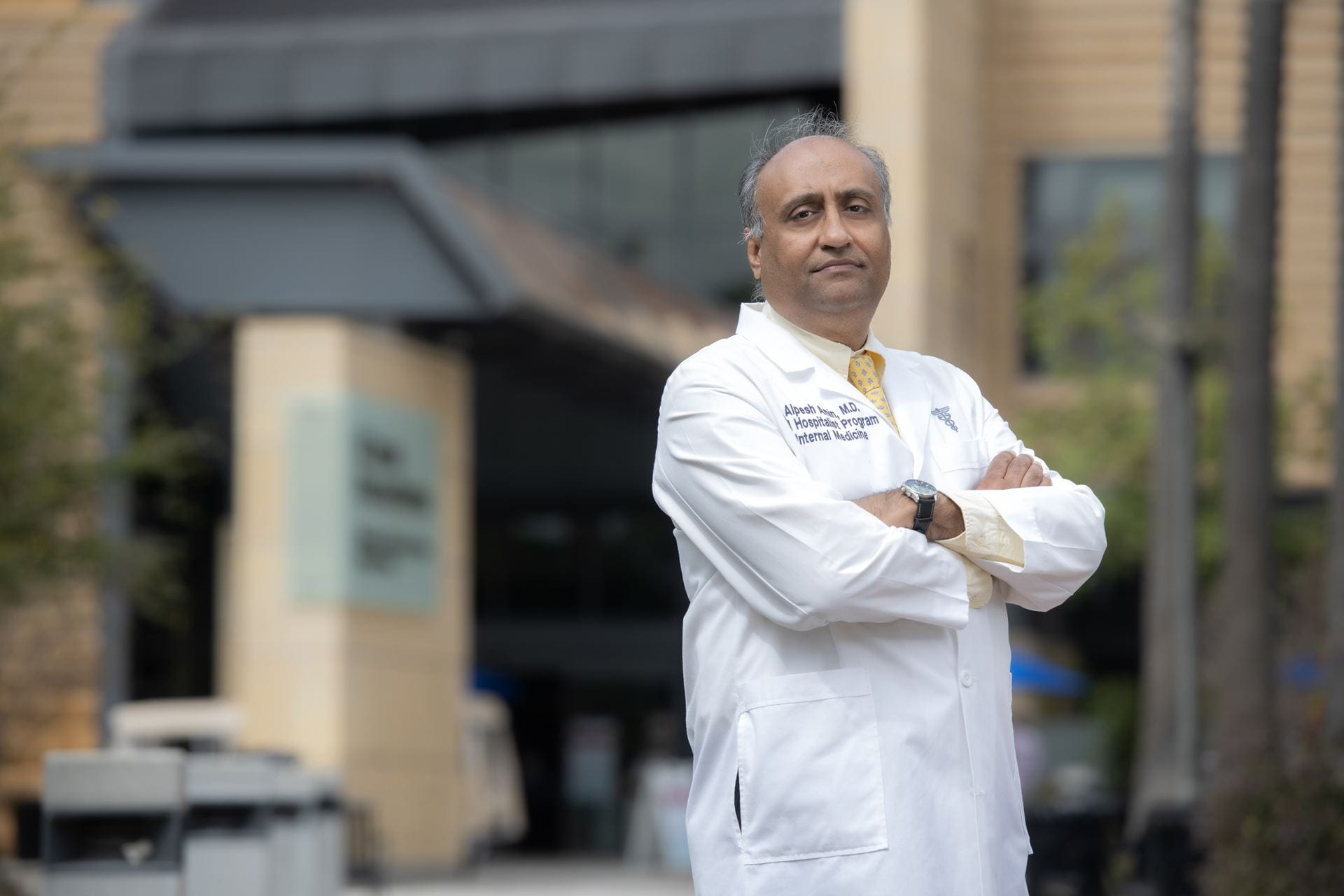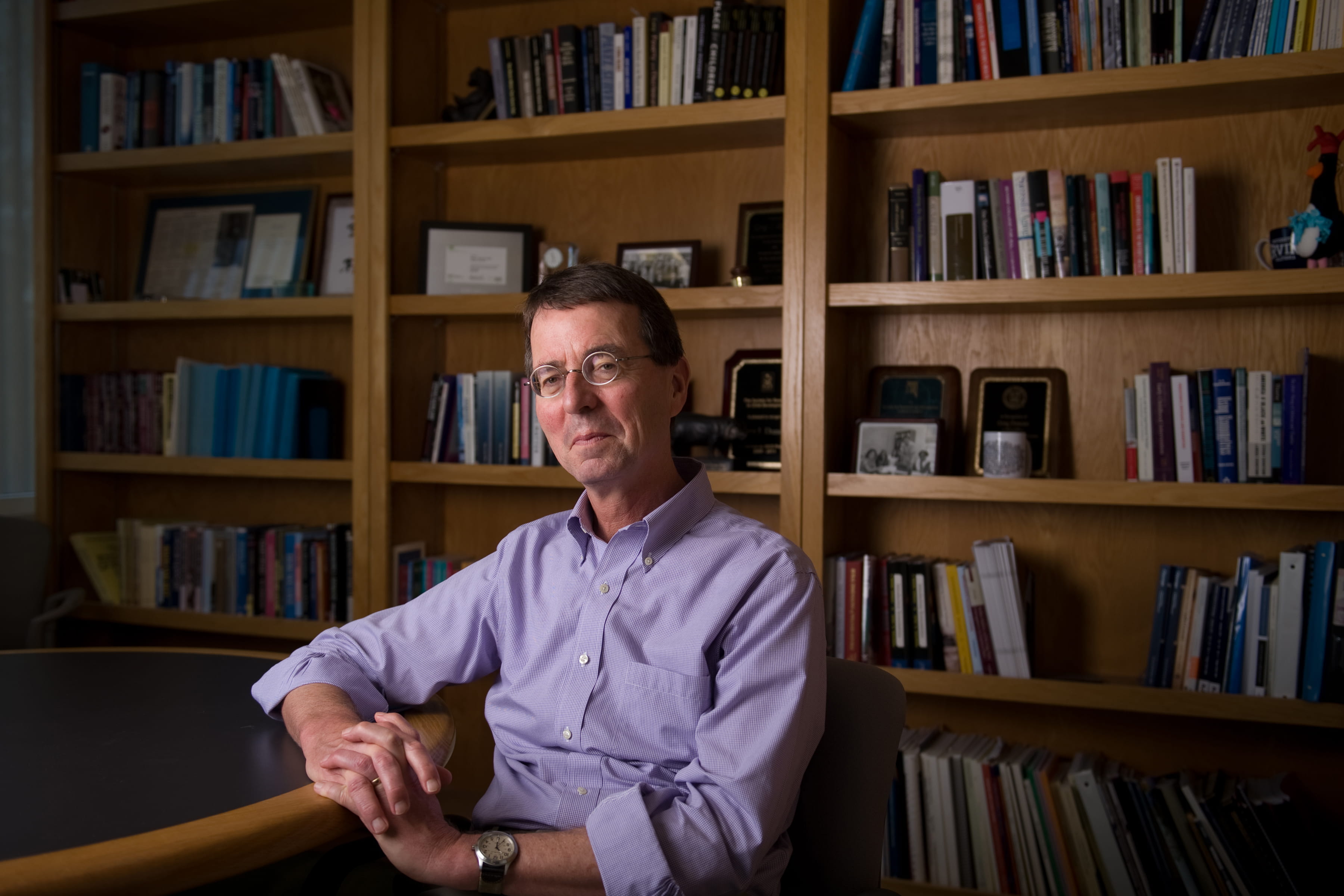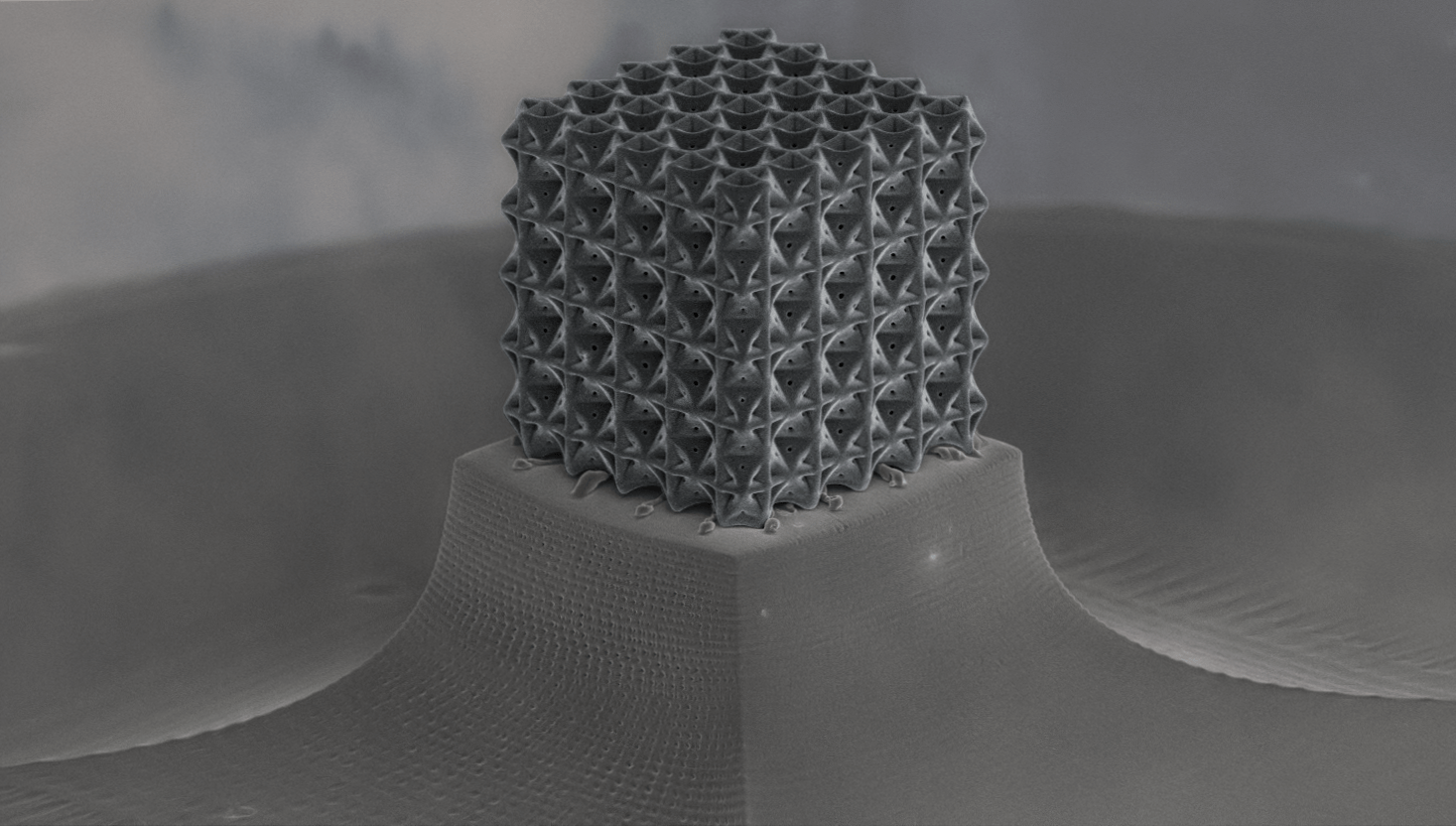Precision health perspectives
Alpesh Amin discusses how utilizing health data can lead to the very best care and chance for good health

In February, UCI launched the Institute for Precision Health, a campus-wide, interdisciplinary endeavor that merges UCI’s powerhouse health sciences, engineering, machine learning, artificial intelligence, clinical genomics and data science capabilities. The objective is to identify, create and deliver the most effective health and wellness strategy for each individual person and, in doing so, confront the linked challenges of health equity and the high cost of care.
IPH will bring a multifaceted, integrated approach to what many call the next great advancement in healthcare. The institute is an ecosystem for collaboration across disciplines.
In addition to being the co-director & medical director of the Institute for Precision Health, Dr. Alpesh N. Amin, professor and chair of medicine, founded and developed UCI Health’s innovative hospitalist program. Hospitalists are doctors who primarily focus on taking care of hospitalized patients and running high quality, efficient hospitals.
Amin says he relishes all opportunities to use his combined M.D. and M.B.A. background, and his role in the Institute for Precision Health is the true dream come to life. “I’ve had many chances to help improve the quality and the safety of patient care at UCI, but IPH is truly the next level. It will allow us the opportunity to use health data how I always envisioned it should be used: to deliver the very best care and the very best chance at good health,” he says.
Amin has been recognized as one of “America’s Top Physicians” by Consumers’ Research Council of America, and he’s published hundreds of articles in academic publications. Here, he shares why he’s passionate about being on the ground floor of IPH.
You’ve had a long career as a physician, a hospitalist, a researcher and a professor. What intrigues you about IPH?
I’m most interested in this opportunity to use data to create value. I would love to see us be able to develop healthcare technology like the automobile industry has. If I’m sitting in an advanced car like a Tesla, and I want to go from point A to point B, it gives me the route. If something distracts me while I’m driving, I hear an alarm to get my attention and prevent an accident. And if I’m enroute and 15 miles ahead an accident occurs, it redirects me. So basically, it guides my journey. Precision health offers the potential also do that sort of guiding to patients on their health journeys. And this potential very much interests me.
I know that data will impact patient care and healthcare delivery, it will impact outcomes, and it will impact population health and individual health in a meaningful way. That’s what I want.
Do these changes feel imminent?
Sticking with the transportation metaphor, I’d say we’re still building the airplane. When my mom was a small kid mainly growing up in India, she and her parents relocated to Africa for a bit. The only way they could get to Africa was by a boat, and that took weeks. Of course, today you can fly from India to Africa in a few hours.
For precision health purposes, we’ve got the data and we know where our Africa is – that is, where we want to go. And we know we can fly over there, that it’s possible. But we still need to build the right plane. And then we must keep refining the plane to make the experience and results better and better.
My dad is a structural engineer. He designs skyscrapers. Sixty- or 70-plus years ago there was only a hope that you could build a skyscraper 100-plus stories tall. There was certainly the interest because land was getting more and more expensive, and there wasn’t as much of it. So, people knew that they needed to go up, but it hadn’t been done. Now we have many 100-plus story skyscrapers. I suppose my point is that we tend to innovate when we need to, when the will is there. I think the question is: Are we motivated to create a world where health data is used the way it should be used – to the benefit of each person and community?
You have an abiding appreciation of data. Is that correct?
Yes! Twenty years ago, when I started my career, I wrote down a list of five or six goals or at least things that I wanted to do with my professional life that I thought would make an impact. I still have that piece of paper, in fact. One of my goals: I will be a data-driven doctor.
I knew I’d have 30, 40 maybe even 50 years of a medical career. I wanted to consider what I could do to have an impact. My thought process was, “Well, I’m not going to be professional athlete. What can I do to really make a difference?”
Was a career as a professional athlete a serious possibility?
Yes, there was a time when I could have pursued a baseball career. I had coaches and others tell me I could do it. I decided not to pursue sports, but instead to take the doctor path. I sort of applied an athletic mindset to the whole thing, though. I set my intention to become a doctor, yet knew I needed goals and needed to be passionate about my career. I thought that if I’m going to spend 30- to 40-plus years doing something, why shouldn’t I make an impact? Anyhow, that’s how I came up with the list and become focused on the idea of being data driven.
Of course, data is at the heart of precision medicine.
It is. But, you know, data is at the heart of almost anything successful. If I’m developing a new program, there must be financial sustainability. I need data to substantiate that. When I’m doing research, there’s obviously data around that. When I’m treating patients, I want to deliver the highest quality healthcare and the best results. I need data to define my notion of what quality is. I think we all know by now that data is essential. It’s just with precision medicine, we’ll be able to do more with data, and eventually it will lead to better care and more medical breakthroughs. I’m in the business of creating resources that will allow us to further innovate in health and patient care, and ultimately translate that knowledge and approach forward. This is what really inspires me.
What do you anticipate or hope for in the next few years? Do you feel like this is going to move swiftly, or do you feel we’ll see slow, incremental improvements?
It all depends on us! It’s partly resources, it’s partly people, it’s partly culture, it’s partly vision, it’s partly commitment. The speed at which we advance will depend on all of it!
But here we are standing at the beginning, and I feel we are the fortunate ones that get to say, we started it, we built it. Whoever is here at the front end of this is lucky enough to be able to do the innovation part of the project. We’ll build the structure and the first partnerships, which is quite amazing. There’s always going be the next phase, which is further innovation, or the next person or group who comes in, but I’ll be delighted to say I was here in the beginning and put the effort in to create IPH.
In a way, you’re kind of like your dad, building skyscrapers …
I didn’t think of it that way before, but sort of. IPH is a skyscraper of sorts at UCI. It will reach epic heights – metaphorically! I have an M.D. and an M.B.A., so what I really enjoy is thinking in terms of medicine and building sustainable innovation – that is, purpose-based businesses which are scalable. Whenever I can bring those worlds together, I’m thrilled. And if they are “skyscrapers,” that’s terrific too.
Is purpose key here?
Absolutely. Everyone who is working with IPH sees the goal as healing patients – not just publishing papers or anything like that. Nothing against academic papers – I have something like 250 papers I’ve published – but it’s just not the point with this. We might publish papers, but we primarily want to do things that produce impact. And by that, I mean better health in people. There’s extremely tangible value with precision health and IPH. I think that’s cool. And it’s a great thing to be able to develop this and watch where it leads.
If you want to learn more about supporting this or other activities at UCI, please visit the Brilliant Future website at https://brilliantfuture.uci.edu. Publicly launched on October 4, 2019, the Brilliant Future campaign aims to raise awareness and support for UCI. By engaging 75,000 alumni and garnering $2 billion in philanthropic investment, UCI seeks to reach new heights of excellence in student success, health and wellness, research and more. UCI Health Affairs plays a vital role in the success of the campaign. Learn more by visiting https://brilliantfuture.uci.edu/uci-health-affairs/.
About UCI Institute for Precision Health: Founded in February 2022, the Institute for Precision Health (IPH) is a multifaceted, integrated ecosystem for collaboration that maximizes the collective knowledge of patient data sets and the power of computer algorithms, predictive modeling and AI. IPH marries UCI’s powerhouse health sciences, engineering, machine learning, artificial intelligence, clinical genomics and data science capabilities to deliver the most effective health and wellness strategy for each individual person and, in doing so, confronts the linked challenges of health equity and the high cost of care. IPH is part of UCI Health Affairs, and is co-directed by Tom Andriola, vice chancellor for information, technology and data, and Leslie Thompson, Donald Bren Professor of psychiatry & human behavior and neurobiology & behavior. IPH is a comprised of seven areas: SMART (statistics, machine learning-artificial intelligence), A2IR (applied artificial intelligence research), A3 (applied analytics and artificial intelligence), Precision Omics (fosters translation of genomic, proteomic, and metabolomic research findings into clinical applications), Collaboratory for Health & Wellness (provides the ecosystem that fosters collaboration across disciplines through the integration of health-related data sources), Deployable Equity (engages community stakeholders and health-equity groups to create solutions that narrow the disparities gap in the health and wellbeing of underserved and at-risk populations.) and Education and Training (brings data-centric education to students and healthcare practitioners so they can practice at the top of their licenses).


